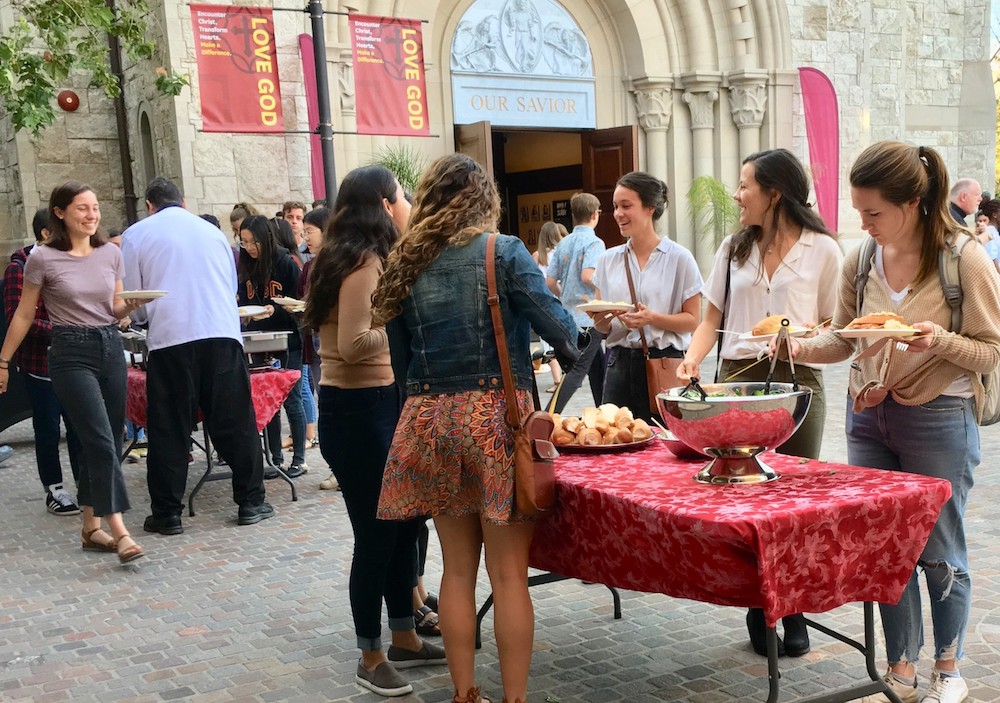The 5 p.m. Sunday Mass concludes at Our Savior Church just north of the USC campus. It’s a Palm Sunday gathering with more than 270 USC students, and two lines form at tables angled around the outskirts of the sun-shaded plaza.
Our Savior pastor, Father Richard Sunwoo, greets the students as they exit and then fill their plates with helpings of barbeque chicken and potatoes, salad and bread along with lemonade.
Some take their meals to join friends on the patio benches. Others venture to the round dining tables inside the USC Caruso Catholic Center’s Newman Hall. A few even have their plates to go, skating off toward dorm rooms or apartments across the street, to go study for finals.
Sunwoo smiles when hearing a question about what he likes most about watching this weekly event called Sunday Suppers, or officially designated on the CatholicTrojan.org website as “Sunday SCuppers.”
“I’m a lover of alliteration and there’s something about ‘Sunday Supper’ that just sounds right to me, you know?” Sunwoo replies. “The name should evoke something that may be missing in a young person’s life. Rarely do students get to sit down for a Sunday supper with their parents anymore.
“They’re in this atmosphere, among their peers, acknowledging they don’t have to go eat by themselves with their headphones on or watching a YouTube video. Here’s where they have a chance to interact and engage one another.”
Rosie Chinea Shawver, the director of Campus Ministry at USC Caruso Catholic Center, explained that as “Christ was constantly breaking bread with people, we’re trying to embody that notion of hospitality and love with and among our students.”
She said the catered supper originated as a Thursday night communal event but was moved to Sundays for the last three years. While several hundred students attend the 10 a.m. and 9 p.m. Mass, organizers have watched the 5 p.m. Mass grow “as an important catechetical entry point,” she said. Occasionally, guest speakers are added and shorts videos shown in an effort to evangelize and engage the student community.
“If you think of millennials as self-absorbed or disengaged, we see more examples of their participation and empowerment in this young Church,” Sunwoo adds. “When young people know and feel they’re part of the Church, they discover ways of opportunity.”
One opportunity has emerged as simply the residue of finding a need amongst the students.
Food scarcity and insecurity has become a harsh reality with many college students, even at a place considered to be a well-off private institution like USC. Tuition and books may be taken care of with some scholarships and financial aid, but room and board can be tougher to budget.
What campus religious organizers have come to realize in recent years is the Sunday Suppers serve an important basic necessity.
“We don’t ask any questions, but our students know other fellow students who are in need,” said Sunwoo. “We see how they are mindful and want to preserve a person’s dignity. One of our students said it best: She feels we’re helping serve dignity along with food.”
Sunwoo said without directly asking students if they are in extra need, they notice a correlation of attendance at the Sunday Supper increase at the end of the month. It’s similar to what the nearby St. Francis Center sees with its homeless clients as government checks come at the start of the month and money tightens toward the end.
Some USC students are also dependent on the St. Francis Center food bank, “which our administration did not know about until recently,” said Sunwoo. “As we learn more about students who may be living in their cars, all over the state, it’s important to ask why this happens.”
USC’s freshman class accepts about 2,700 students each year, and of that some 600 to 850 self-identify as Catholics, Sunwoo noted, “which means, multiply that by four (for each class), we see only a fraction of them coming to Mass here.”

Jose Hernandez accepted an invitation from a classmate during his sophomore year. He graduates in May with a degree in industrial and systems engineering and has been vice chair of advancement on the Student Executive Board.
“It may have been a different world coming to USC, but you start to realize things you have in common with students more than just the superficial ways of where you come from,” said Hernandez, who grew up in the California central valley town of Porterville, raised by a single mother.
“Like in Mass, there is a meal centered around the altar and being nourished spiritually with the Eucharist. And then God calls us to incorporate a meal as a great way to facilitate that nourishment after the Mass.”
Shawver says the Sunday Supper usually takes summer break as the student population diminishes, but the next large gathering is expected when the Newman Guild will be present to hand out “Finals Survival Packets” to the students Sunday, April 28 — the same day Archbishop José H. Gomez is scheduled to administer the sacrament of confirmation at the 5 p.m. Mass.
“We desire everyone who comes to experience the love of God and we hope to create that environment at Sunday Supper,” said Shawver. “This is a consistency of love that’s always needed.”
Tom Hoffarth is an award-winning journalist based in Los Angeles.

